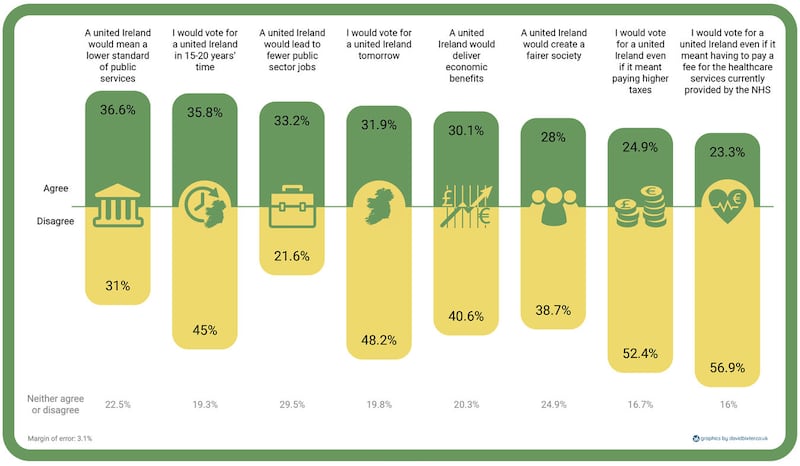SUPPORT for a united Ireland among voters stands at almost one-third, fresh polling reveals.
But commentators last night insisted that those campaigning for Irish unity shouldn't be disheartened because figures on future polling show a gap of fewer than ten points between the nationalist and unionist blocs for a poll in 15-20 years.

Asked about unity now, 30 per cent would vote in favour and 45.3 per cent against.
Campaigners point to the example of Scotland, where the pro-independence campaign made huge strides in the run-up to 2014's referendum, before ultimately losing by a 10 per cent margin.
Today's Institute of Irish Studies-University of Liverpool/The Irish News poll reveals that a significant swathe of the electorate have yet to make their minds up on the constitutional question.
People who don't know how they'd vote in a border poll, combined with those who neither agree or disagree, represent almost a quarter of respondents (24.7 per cent), compared to 30 per cent who would vote 'yes'.
Also encouraging for nationalism is that the survey shows how support for Irish unity increases in the long-term.
When respondents are asked if they would vote for a united Ireland in 15-20 years' time, support grows to 33.4 per cent, while opposition drops to 41.5 per cent – less than a ten point gap – with don't knows and neither agree or disagree rising slightly to 25.5 per cent.
"Although whilst there are challenges, there are also opportunities for growth that are quickly apparent in the poll and can provide those wanting constitutional change with hope for the future," commentator David McCann writes in The Irish News today.
He said the pro-independence campaigns in Scotland and Quebec in the mid-1990s "gained substantial momentum in the final weeks".
"Once a campaign is called it generates its own momentum," writes the Slugger O'Toole deputy editor.
"On these numbers, the pro-unification side is competitive but cannot afford to be complacent – the pro-union argument does have an overall lead in its favour with less ground to make up, but there are vulnerabilities there that it will have to guard against."
Columnist with The Irish News Chris Donnelly said: "Ultimately, the poll merely confirms that our constitutional future will be determined by the vast swathe of voters in a middle ground that has changed beyond all recognition over the past generation."
Read More
- Support for Irish unity gives hope to nationalism (premium)
- Poll finds stalling executive formation after election has little public support
- Public backs assembly reform alongside ditching of first and deputy first minister titles
- Peter Shirlow – Northern Ireland is moving beyond the desert island (premium)
- Anna Mercer – Overhauling the Stormont system would provide a better route to delivery (premium)
- David McCann – Those who care the least about the constitutional question will be key in referendum outcome (premium)








